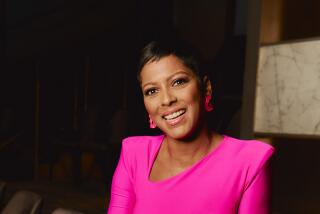Speaking Out Can Solve Ills, Hill Tells Audience : Speech: ‘Healing occurs only when our stories are shared,’ says law professor who made allegations of sexual harassment against Supreme Court nominee.
- Share via
In her first Los Angeles appearance since accusing now-Supreme Court Justice Clarence Thomas of sexual harassment, law professor Anita Hill encouraged a group of black women Friday to speak out against such behavior in the workplace and confront whoever is behind the abuse.
“Speaking out about one’s experiences opens the speaker to understand how she or he was victimized,” Hill said in the same professorial tone she used in her testimony before the Senate Judiciary Committee. “Healing occurs only when our stories are shared.”
In her address to the National Black Women’s Health Project, Hill also criticized the Navy for its slow initial reaction to women’s reports that they were fondled and harassed in the Tailhook sexual abuse scandal, saying that the Navy “typifies the responses of employers that are not only insensitive to the complaining party, but allow the perpetuation of misconduct.”
Hill, who is on a yearlong national speaking tour, received a hero’s welcome and an award praising her honesty.
Those attending the conference at UCLA roared with approval when Hill took the podium and swarmed around her afterward seeking autographs, a reaction she said was a far cry from the televised grilling she received in October, 1991, when she raised the allegations against her former boss.
Organizers of the health conference said Hill was invited to speak because said she represents the kind of frankness that is essential to any debate and because they consider sexual harassment against women a health hazard.
The conference brought together academics, social workers and others to discuss health care issues that affect the black community. African-American women in particular, organizers said, are at greater risk than other populations for heart disease, hypertension, diabetes and AIDS.
“Black women feel a strong sense of urgency to solve some of these problems before our communities become irretrievably damaged,” said Fran Jemmott Dory, chairwoman of the health project.
“Sexual violence against black women, punitive and discriminatory reproductive policies, and the escalating and unchecked incidence of AIDS among black women and black babies are just a few of the issues that are crippling our women.”
Hill, who is on a leave of absence from the University of Oklahoma during her speaking tour, was one of seven women to receive the group’s leadership award during the three-day conference, which ends Sunday.
“Anita Hill for a lot of us represents speaking out,” said Pamela Freeman, a therapist from Philadelphia. “She may be conservative politically and different from a lot of us here, but she’s still our role model.”
Other honorees were author Alice Walker; activist Angela Davis; Carolyn Reid-Green, president of the Drew Child Development Corporation in Los Angeles, Lilian Mobley, a local health advocate for low-income residents; Lanette Jimerson, a 17-year-old peer counselor, and Denise Rouse, founder of the District of Columbia Women’s Council on AIDS.
More to Read
Sign up for Essential California
The most important California stories and recommendations in your inbox every morning.
You may occasionally receive promotional content from the Los Angeles Times.













